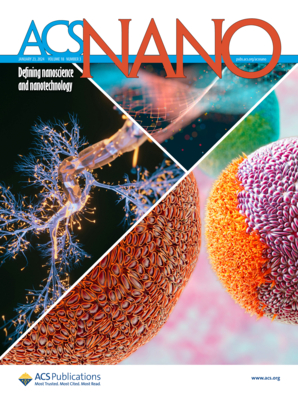Regulating the Tumor Microbiome through Near-Infrared-III Light-Excited Photosynthesis
IF 15.8
1区 材料科学
Q1 CHEMISTRY, MULTIDISCIPLINARY
引用次数: 0
Abstract
Tumor microbiomes are increasingly associated with the growth and metastasis of tumors. Exploring the regulation of the tumor microbiome through therapeutics is an area of interest in cancer therapy. In this study, the authors have investigated a biohybrid with 1550 nm light-excited photosynthetic ability to regulate the tumor microbiome. This system utilizes Er-based core–shell upconversion nanoparticles to arm microalga Chlorella, enabling the rapid evolution of Chlorella to perform oxygenic photosynthesis under 1550 nm light excitation. This biohybrid may alleviate hypoxia within the tumor microenvironment and induce significant changes in the tumor microbiome, ultimately resulting in marked inhibition of tumor growth. Benefiting from the strong tissue penetration ability of 1550 nm light, this biohybrid also exhibits clear inhibition of deep-seated tumors. The therapeutic efficacy of microbiome regulation is directly mediated by immune activation, converting “cold” tumors into “hot” tumors, which also leads to a long-lasting immune memory effect.

通过近红外- iii光激发光合作用调节肿瘤微生物组
肿瘤微生物组与肿瘤生长和转移的关系日益密切。通过治疗方法探索肿瘤微生物组的调节是癌症治疗的一个感兴趣的领域。在这项研究中,作者研究了一种具有1550 nm光激发光合能力的生物杂交种,以调节肿瘤微生物群。该系统利用er基核壳上转换纳米颗粒武装小球藻,使小球藻在1550 nm光激发下快速进化,进行含氧光合作用。这种生物杂交可能会缓解肿瘤微环境内的缺氧,诱导肿瘤微生物组发生显著变化,最终导致肿瘤生长受到明显抑制。得益于1550 nm光强大的组织穿透能力,该生物杂合物对深部肿瘤也有明显的抑制作用。微生物组调节的治疗效果是通过免疫激活直接介导的,将“冷”肿瘤转化为“热”肿瘤,这也导致了持久的免疫记忆效应。
本文章由计算机程序翻译,如有差异,请以英文原文为准。
求助全文
约1分钟内获得全文
求助全文
来源期刊

ACS Nano
工程技术-材料科学:综合
CiteScore
26.00
自引率
4.10%
发文量
1627
审稿时长
1.7 months
期刊介绍:
ACS Nano, published monthly, serves as an international forum for comprehensive articles on nanoscience and nanotechnology research at the intersections of chemistry, biology, materials science, physics, and engineering. The journal fosters communication among scientists in these communities, facilitating collaboration, new research opportunities, and advancements through discoveries. ACS Nano covers synthesis, assembly, characterization, theory, and simulation of nanostructures, nanobiotechnology, nanofabrication, methods and tools for nanoscience and nanotechnology, and self- and directed-assembly. Alongside original research articles, it offers thorough reviews, perspectives on cutting-edge research, and discussions envisioning the future of nanoscience and nanotechnology.
 求助内容:
求助内容: 应助结果提醒方式:
应助结果提醒方式:


